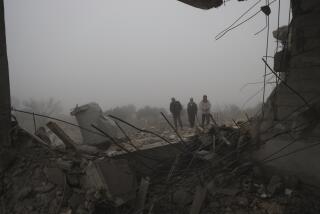Iran Rebuffs Iraqi Bid for Assistance : Diplomacy: A Hussein emissary leaves Tehran after failing to persuade its leaders to release planes, support fellow Muslims.
AMMAN, Jordan — A high-level emissary of Iraqi President Saddam Hussein left Tehran on Saturday without satisfaction on his military or diplomatic appeals.
The Iranian government flatly refused a personal request from Hussein for the return of about 90 Iraqi aircraft that have been flown to Iranian soil. Instead, it again demanded that Iraq withdraw from Kuwait.
Iranian Foreign Minister Ali Akbar Velayati, in two days of talks with Iraqi Deputy Prime Minister Sadoun Hammadi, underlined the Iranian decision that the pilots and planes, which include top-line MIG-29 fighters and SU-24 bombers, will remain impounded until the end of the Persian Gulf War, the official Iranian news agency reported.
Hammadi declared the talks “good and fruitful,” but his mission appeared to be a failure. The Iranians listened to his complaints about the devastation wrought by allied bombs but remained adamantly neutral despite an apparent appeal for Muslim solidarity.
“The only solution to the war is an Iraqi withdrawal from Kuwait and the withdrawal of all foreign forces from the region,” the news agency quoted Iranian President Hashemi Rafsanjani as saying after meeting Hammadi and receiving a personal letter from Hussein.
Later, in talks with visiting Algerian Foreign Minister Sid Ahmed Ghozali, Rafsanjani said: “We see Muslims being killed and their resources destroyed through an arrogant plot with international justification. Unfortunately, this condition arose from a wrong and miscalculated move, providing an opportunity for enemies of Islam.”
While Iran’s position on the war has remained steadfast, the issue of the Iraqi planes has been clouded by uncertainty over the motives of the pilots, whether they were deserting or simply flying their aircraft to shelter from the allied air onslaught of the first two weeks of the war.
Velayati was quoted as telling the Iraqi envoy that Iranian officials are unhappy that the planes “arrived without any prior consultation,” suggesting that Baghdad had ordered the pilots to deliberately seek refuge in Iran in the hope of using the planes later in the conflict. If that was Hussein’s intention, he appears to have miscalculated.
Rafsanjani’s meetings Saturday with Ghozali and Yemen’s minister of state for foreign affairs, Abdulaziz Dali, focused on a political solution to the war “to end the misery of the Muslim and neighboring nation of Iraq,” the news agency said.
Velayati is scheduled to attend a ministerial conference of the Nonaligned Movement in Belgrade, Yugoslavia, this week, where delegates will discuss an Indian peace plan that reportedly links Iraqi withdrawal from Kuwait to an international conference on the Palestinian issue, a formula so far unacceptable to Washington, Jerusalem and Baghdad.
More to Read
Sign up for Essential California
The most important California stories and recommendations in your inbox every morning.
You may occasionally receive promotional content from the Los Angeles Times.










